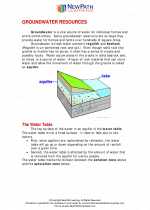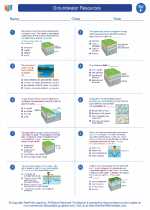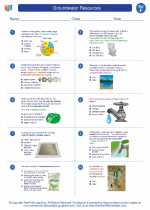Groundwater Resources -> conservation
Conservation
Conservation refers to the careful and sustainable use of natural resources, the protection of the environment, and the preservation of wildlife and ecosystems. It involves maintaining the balance between meeting our current needs and ensuring that future generations can also meet their needs.
Why is Conservation Important?
Conservation is important because it helps to maintain the balance of ecosystems, prevents the extinction of plant and animal species, and ensures that natural resources are available for future generations. It also helps to mitigate the impact of climate change and protects the quality of the air, water, and soil.
Ways to Conserve
There are several ways to practice conservation:
- Reduce, Reuse, Recycle: This involves reducing the amount of waste we produce, reusing items when possible, and recycling materials to minimize the use of new resources.
- Energy Conservation: Conserving energy by using energy-efficient appliances, turning off lights when not in use, and using alternative energy sources.
- Water Conservation: Using water wisely by fixing leaks, using water-saving appliances, and being mindful of water usage.
- Wildlife Conservation: Protecting natural habitats, supporting conservation organizations, and advocating for laws and policies that protect wildlife.
- Environmental Education: Educating others about the importance of conservation and sustainable practices.
Conservation Study Guide
- Define conservation and explain its importance.
- List and describe at least three ways to practice conservation.
- Explain the impact of conservation on ecosystems and wildlife.
- Discuss the role of individuals and communities in conservation efforts.
- Research and present a case study of a successful conservation project or initiative.
◂Science Worksheets and Study Guides Sixth Grade. Groundwater Resources
Study Guide Groundwater Resources
Groundwater Resources  Worksheet/Answer key
Worksheet/Answer key Groundwater Resources
Groundwater Resources  Worksheet/Answer key
Worksheet/Answer key Groundwater Resources
Groundwater Resources  Worksheet/Answer key
Worksheet/Answer key Groundwater Resources
Groundwater Resources  Vocabulary/Answer key
Vocabulary/Answer key Groundwater Resources
Groundwater Resources  Vocabulary/Answer key
Vocabulary/Answer key Groundwater Resources
Groundwater Resources 

 Worksheet/Answer key
Worksheet/Answer key
 Worksheet/Answer key
Worksheet/Answer key
 Worksheet/Answer key
Worksheet/Answer key
 Vocabulary/Answer key
Vocabulary/Answer key
 Vocabulary/Answer key
Vocabulary/Answer key

The resources above cover the following skills:
EARTH AND SPACE SCIENCE
Earth’s Systems
Use research-based evidence to propose a scientific explanation regarding how the distribution of Earth’s resources such as minerals, fossil fuels, and groundwater are the result of ongoing geoscience processes (e.g., past volcanic and hydrothermal activity, burial of organic sediments, active weathering of rock).